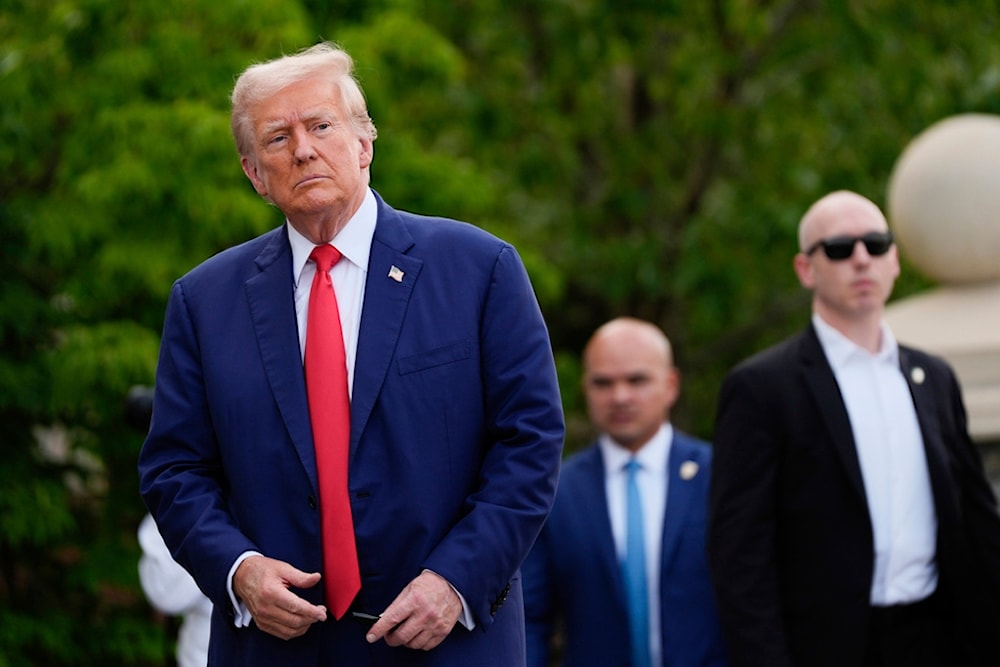Trump threatens secondary tariffs on Russian oil over Ukraine war
According to recent reports, the Russian state-owned shipping company Sovcomflot saw its transportation volumes drop by 16% in 2024, largely due to ongoing restrictions on its operations.
-

Republican presidential nominee former President Donald Trump walks after a news conference at Trump National Golf Club, Aug. 15, 2024, in Bedminster, N.J. (AP Photo/Julia Nikhinson, File)
US President Donald Trump signaled on Sunday that he is prepared to take aggressive economic action against Russia's oil sector if no agreement is reached with Moscow to end the war in Ukraine.
Speaking to NBC News, Trump warned that he would impose tariffs on Russian oil exports if peace talks fail and he determines that Russia is to blame for the ongoing conflict. "If Russia and I are unable to make a deal on stopping the bloodshed in Ukraine, and if I think it was Russia's fault — which it might not be — but if I think it was Russia's fault, I am going to put secondary tariffs on oil, on all oil coming out of Russia," he said.
He further stated that third-party countries or companies buying Russian oil would face consequences in the US market. "There will be a 25% tariff on all oil, a 25- to 50-point tariff on all oil," Trump added, suggesting a broad enforcement strategy aimed at restricting Russia's energy revenue.
According to recent reports, the Russian state-owned shipping company Sovcomflot experienced a 16% drop in transportation volumes in 2024, moving approximately 63 million metric tons compared to 75 million tons the previous year. The decline is owed to the impact of Western sanctions and restrictions targeting Russia's energy sector.
Despite these setbacks, Russia has continued to export oil using a so-called "shadow fleet" of over 400 older and less transparent tankers. Many of these vessels are operated by opaque entities or registered in jurisdictions that are not participating in sanctions, allowing Russia to bypass restrictions such as the G7's $60-per-barrel price cap and sustain its oil revenues. This workaround has enabled Moscow to finance its military operations in Ukraine, even as formal sanctions remain in place.
Meanwhile, global energy traders remain doubtful that Russian oil will reenter Western markets in any significant way—even if sanctions are lifted—pointing to a likely long-term disruption of Russia's traditional energy export routes.
Read more: TotalEnergies expert predicts partial return of Russian gas to Europe
Despite his frustration, Trump said he still maintains a working relationship with Russian President Vladimir Putin and intends to speak with him again soon. "I'm angry at him for not making a deal with me yet, but I have a very good relationship with him," Trump told NBC. "We're going to have a phone call this week."
US-Ukraine resource deal sparks sovereignty fears
The president's comments arrive amid increasing controversy surrounding a draft US-Ukraine economic agreement, which has drawn criticism from Ukrainian lawmakers and EU officials.
The draft deal, leaked earlier this week, proposes the creation of a US-controlled investment fund—registered in Delaware and operating under New York law—that would oversee Ukraine's oil, gas, mineral, and infrastructure sectors.
Critics, including Ukrainian lawmakers and EU officials, warn the arrangement could compromise Ukraine's sovereignty and limit future European investment. Under the current terms, the US would claim all revenues until Ukraine repays a $100 billion debt, plus 4% interest, after which profits would be shared.
Read more: Ukraine's allies meet in Paris to discuss new aid, security commitment

 3 Min Read
3 Min Read











